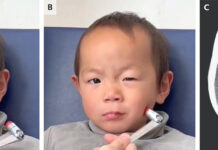A 4-year-old boy presented with vague clinical features, the doctors diagnosed him with Vitamin A toxicity after a series of investigations!
Parents brought an otherwise healthy, 4-year-old boy to the emergency department with complaints of polydipsia, fatigue, irritability, cheilitis, and a refusal to bear weight for 2 days. The parents revealed that the boy had similar symptoms 1 month back, however, the symptoms had resolved. Can the symptoms be due to any vitamin deficiency or toxicity of a vitamin?
On physical examination, the child was of normal height and built. His vital signs were normal too. However, he appeared pale. The ER physicians observed severe cheilitis, dry skin, diffuse alopecia, and periorbital and pedal oedema.
Serological investigations revealed severe hypercalcemia, hyponatremia, hypokalemia, mildly elevated creatinine, elevated C-reactive protein, leukocytosis, and normocytic anaemia.
Ultrasound of the abdomen revealed bilateral pelviectasis and medullary nephrocalcinosis. The boy received intravenous (IV) fluids in the emergency room.
Moreover, his further blood results showed low levels of parathyroid hormone and 1,25-dihydroxyvitamin D (1,25(OH)2D). However, his thyroid-stimulating hormone level was normal.
Skeletal radiographs showed diffuse osteopenia, and periosteal reactions along the ribs, both radii and clavicles.
During the hospital stay, he developed worsening and persistent bi-cytopenia, i.e. anaemia and thrombocytopenia, necessitating a blood transfusion. He also had elevated inflammatory markers, although he was afebrile and had negative blood cultures. He had elevated liver enzymes, low albumin levels, and prolonged INR. Ultrasound of the liver suggested fibrosis.
Workup for malignancy was negative. Brain, spinal, and chest magnetic resonance imaging of the brain, spine, and chest identified elevated optic discs. However, there were no other structural abnormalities and the findings were consistent with pseudotumour cerebri.
After 2 weeks of management in the hospital, tests revealed significantly elevated levels of vitamin A. A review of his diet showed that he predominantly consumed a plant-based diet, with an overall high vitamin A intake from a different source. The boy’s main sources of vitamin A included kale, green vegetables, fruit, and meat (nonliver), plus a multivitamin containing vitamin A as β-carotene. Moreover, his parents revealed that he was taking cod liver oil supplements for over a year, however, he had stopped taking cod liver oil supplements several months prior to this presentation.
The patient’s hypercalcemia was managed with IV hyperhydration, subcutaneous calcitonin, IV bisphosphonates, and a low vitamin A diet. The physicians discharged him.
At the 1-month follow-up, the patient’s hypercalcemia and bi-cytopenia had resolved. Moreover, his papilledema improved, therefore, they tapered off acetazolamide.




